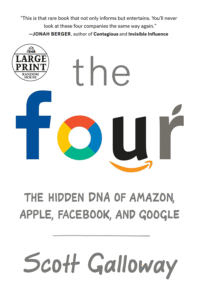Book Review: The Four
By Raheel Shakeel | Bookmark | Published 6 years ago

The Four Horsemen in the Biblical end of times symbolise Conquest, War, Famine and Death. With their dark powers combined they would rain plague and pestilence, ushering in the end of times. It would take a wild stretch of imagination to compare the likes of Apple, Google, Facebook and Amazon with these biblical figures, but that really is the central premise of the book, The Four: The Hidden DNA Of Amazon, Apple, Facebook and Google by Scott Galloway. These tech titans command a combined net worth of 2.3 trillion dollars. That’s more than the GDP of France! For even the most ardent critic of these companies, it is hard to deny that the scale of wealth they have amassed is of biblical proportions, which lends them tremendous power and influence globally.
Even in the context of Pakistan, all of these companies, barring Amazon, have weaved themselves into the fabric of the country’s culture. Our quest for seeking information begins and ends with Google, while Facebook has a huge impact on our social lives. The IPhone is arguably the aspirational phone for the average Pakistani customer and one day, perhaps, who knows, we might be able to get drones delivered at our doorstep by Amazon. But all is not bright and sunny, as the author contends; there is a dark side to all these companies.
Apple controls a paltry 14.5 percent of the smartphone market in term of sales but captures 79 per cent of the global smartphone profits. Amazon has wreaked havoc on the retail business in America, striking fear in the heart of the giant retailer Walmart, which in a spending spree bought jet.com for 3 billion dollars to counter Amazon’s influence. On the other hand, Google and Facebook enjoy complete domination over the ad spending on the internet; by some estimates, their share of the total digital ad spending pie is 81 per cent. These mind-boggling numbers lend the tech companies immense clout in consumer’s lives and provide them the potential to misuse the medium. Not only that, this concentration of wealth in a few hands has led to huge income inequalities in the developed world. According to Galloway, America is home to “3 million landlords and 350 million serfs.”
In this new and perilous economic landscape that is taking shape, data is the new oil and the user is the product. The amount of data that we all collectively spew out is collected and used to manipulate the average consumer. One should look no further than the recent fiasco with Facebook, when another company, Cambridge Analytica, used 80 million Facebook user-profiles to skew the US presidential race in favor of the then contender, Donald Trump. And this was happening right under the company’s nose. Subsequently, Facebook founder, Mark Zuckerberg, had to issue a grovelling apology and was summoned to testify before a Congressional hearing.
In the book, the author investigates how these companies acquired so much power to begin with, and to what extent they control our daily lives. The first part of the book examines the strategies and lessons business leaders can draw from each of the ‘horsemen.’ The second part delves into the origins of the Four’s competitive advantage that gives them an edge over the competition in their respective domains. In the concluding chapters, author Scott Galloway speculates whether there would be the addition of a fifth horseman – candidates as wide and varied as Netflix, Uber, Microsoft and Alibaba are analysed in this respect. Lastly, he lists the professional attributes that would enable one to prosper in this uncertain age of the Big Four.
The glaring oversight of the book is that it overlooks the many contenders in the developing markets such as India and China – which, incidentally, represent the highest number of existing and future users of the Internet. China is a special case in this regard since it has its own version of the Internet, cordoned off by the Great Firewall it has in place. A whole ecosystem of startups has proliferated in the absence of competition from the West. And, in the not too distant future, some promising startups aside from the likes of Alibaba could vie for global domination as China opens up to the world.
Nevertheless The Four is a combination of career advice, business history and counter-culture all, rolled into a highly readable book. The author, who is a professor of marketing at the New York University Stern School Of Business, has the right credentials to help explain scope of the businesses and the manner in which these companies operate. The readers would certainly benefit from the interesting insights of the book and understand the age we live in a little better. The sardonic wit of the author and the creatively made infographics are an added bonus.
The writer has been associated with media and the social sector.He tweets @hadesinshades


